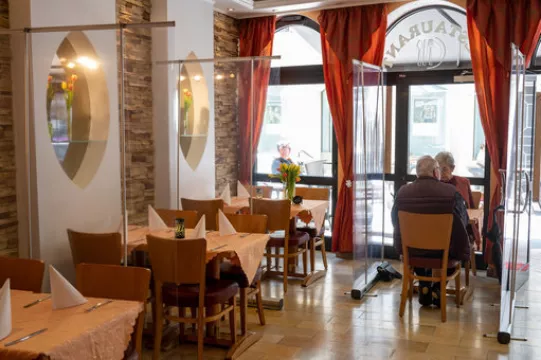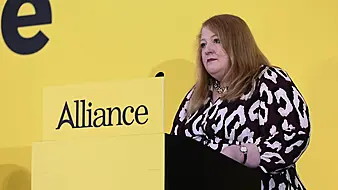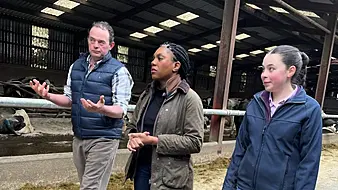The Government's decision to limit indoor dining to vaccinated guests has created a "perfect storm" of litigation issues in relation to workers, according to an employment law solicitor.
In today's Government announcement, Taoiseach Micheál Martin said that the safest way to proceed with a return to hospitality is to limit access to those who have been fully vaccinated and those who have recovered from Covid-19.
“Over the course of the coming weeks, Government will work urgently with the relevant sectors to agree a practical and workable approach,” he added.
“The simple truth is that we are in a race between the variant and vaccines, and we want to do everything we possibly can to make sure that the vaccine wins.”
The move has been met with uproar from business owners and the public, with many people pointing out that unvaccinated waiting staff (many of whom are in their 20s and 30s) will be expected to work.
Dublin-based employment law solicitor Richard Grogan told BreakingNews.ie: “The Government is creating a perfect storm of litigation in relation to their proposal about reopening the workplace, particularly in relation to restaurants.
Health and safety risk
“Nphet's [National Public Health Emergency Team] advice that you have to be vaccinated for indoor dining indicates that it is a health and safety reason for people not to be there if they aren't vaccinated. Therefore, an employee who does not wish to go back in to work indoor dining will simply say, 'I'm raising a health and safety complaint'.
“That health and safety complaint will be, 'you've said it's not safe for people indoor dining, and I'm going to be working for eight hours, they'll be here [customers] for an hour, maybe an hour and half. I don't think it's safe.”
Mr Grogan pointed out that employees would be well within their rights to ask for a two-metre distance between themselves and colleagues, and a one-metre distance between themselves and customers at tables, as “appropriate protection”.
“The employer will say, 'that's not acceptable to me' and the employee will say 'well I've been penalised because I raised a health and safety concern and he/she is attempting to put my health at risk'.”
There has been much speculation over how a vaccine certificate may work, but Mr Grogan pointed out that there are data protection issues around this.
“The Government still have not set out from a GDPR purpose how that evidence is going to be collected,” he explained.
“The position in relation to it, how is that going to be maintained, collected and dealt with under GDPR rules? Who's going to have access to this information?
“If you have a designated data controller standing at the door taking names and checking people off the list, that's fair enough. Then people will show them to the table, when the waiting staff come to the table they will know everyone is vaccinated, but they won't know who they are, then it comes to paying, the person produces their credit card and the waiting staff now know a named individual on the credit card has been vaccinated.
“That then is disclosing vaccination status of a guest to somebody else. This is a potential GDPR complaint against the restaurant.
“Then the only person who can bring them the bill and take payment is the data controller, nominated by the organisation and properly trained up in data protection, who is the one who will have to bring the bill.
“Now if somebody is delivering flowers, for a 60th birthday for example, so someone comes in and leaves flowers for 'Mary O'Reilly', unless the same person is standing at reception to take over these flowers, her vaccination status is disclosed to others.
“There's another issue here, a lot of people in restaurants have name tags, now the people at the table know the named person there is probably not vaccinated.”
Minister Donnelly saying that the protocol will not apply to staff and only people going in, I can tell you as an employment lawyer, they have now declared that going into indoor dining is a health and safety risk without being vaccinated.
“There will have to be clear and definitive rules as to how this will be done,” he added.
Minister for Health Stephen Donnelly has said employees will be exempt to the vaccination rule, but Mr Grogan said this will leave employers open to legal challenges.
“Minister Donnelly saying that the protocol will not apply to staff and only people going in, I can tell you as an employment lawyer, they have now declared that going into indoor dining is a health and safety risk without being vaccinated.
“This means that any employee wishing to challenge it will challenge it, and they won't be able to be brought back to work.
“Somebody could have an underlying health issue themselves, they could be concerned about Covid, they could have legitimate concerns. You will equally have another group with no legitimate concerns but could have a concern the morning that the restaurant is opening up, having got their legal advice to what their concerns should be, so they'll say they have and say 'I'm not turning up today'.”
Mr Grogan said similar issues will come up in non-hospitality issues when employees start to return to the workplace.
“The same issue is coming up with employers in other industries. We have the Data Protection Commissioner saying you can't ask any questions about whether anybody is vaccinated or not.
“Businesses are now being left with no alternative but having people two metres apart, presenting the other issue on whether employers can get people back into offices.
Complex issues
“It was very easy to close this country down, the difficulty we have now is there are complex issues relating to employment law, health and safety and data protection, and medical issues.”
Mr Grogan feels Government has failed to come up with the required legislation for the reopening of businesses.
“There is nobody in Government prepared to put the four of them together and make a decision as to how we open up businesses.
“Minister Varadkar is saying blended working will be the way forward when we have everybody vaccinated in September. There are a certain number of people who will not get vaccinated, but we are now in a position where businesses will not know what percentage is vaccinated or unvaccinated in any particular business.
“We might know what the national figure is, but if a company has 100 employees and five per cent of the country is not vaccinated, that doesn't mean to say that 99 per cent of the people in that particular business aren't vaccinated.
“Then you've got the two-metre rule which won't work. What the Government has done today is they have reacted to what Nphet said, they've come out with a plan that has had about 10 seconds of thought put in as to how it's going to work.
“Minister Donnelly turning around and saying the issue to have to show you are vaccinated won't apply to staff is something that has been said without anybody thinking about what the ramifications and effect of that are.”
Mr Grogan predicts a large number of claims coming before the Workplace Relations Commission (WRC) following the Government's decision.
The lawyers will be dealing with claims that are there because the Government won't legislate as to how businesses open up.
“What will happen is the claims will flow to the WRC and the lawyers will get blamed, it's always easy to blame the lawyers. The lawyers will be dealing with claims that are there because the Government won't legislate as to how businesses open up.
“I am not advocating a car crash of litigation against employers, what I'm saying is this issue needs to be very clearly set out with proper legislation, proper guidelines, and then we need politicians to get off the fence and actually make a set of rules that everybody understands how a business reopens from a restaurant which has five tables down to a multinational.
“How it's done, what the effects are, that's not something the Department wants to address as it takes hard decisions, so they will leave it to lawyers to sue employers left, right and centre.
“If this is not addressed properly businesses will close and jobs will be permanently lost.”
Mr Grogan said legal cases are not inevitable, adding that decisive Government action will be needed to prevent them.
Inaction
“There are always going to be WRC cases but because of the inaction of the Government, 100 per cent of employees will have some claim against 100 per cent of employers over this thing.
“Every employee has a potential claim no matter how a business operates, against their employer, and vice versa.
“All of this litigation is avoidable, all of this heartbreak for employees and employers, if this isn't addressed, employees who do not wish to bring a claim are still going to lose their jobs when an employer is hit with a set of significant costs defending these cases.
“It's a perfect storm, one they can avoid, but they won't. Government has been warned by employment lawyers but the Department of Enterprise, Trade and Employment have stuck their heads in the sand on this.”







